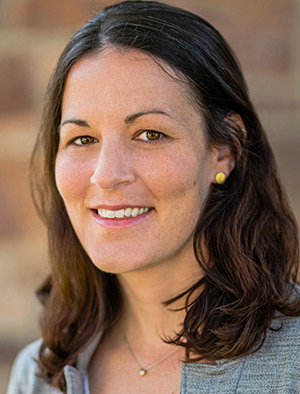
Lauren Padilla
VoLo Senior Environmental Data Scientist II
Work
Areas of expertise:
Air quality, environmental systems modeling, fate and transport, data science, sensors
Description
Lauren Padilla, Ph.D. works with interdisciplinary teams at EDF to reduce air pollution and improve health when facing climate change. Her research uses large environmental monitoring, remote sensing, human activity, and emission source datasets to understand localized patterns of pollution and its root causes. Lauren guides data collection, spatial and statistical analysis and development of scalable, automated tools that lower barriers to large data analysis for researchers and decision-makers. Lauren advocates for open, transparent, and equitable data access and use.
She served as technical advisor to EDF’s Air Quality Data Commons, now part of OpenAQ. She led analysis of mobile air quality monitoring data for the Breathe London pilot. She was also project director for Applying Nature-based Solutions for Toxic Flooding (createnbs.org), a project funded by the NAS Gulf Research Program. Lauren is the data and science lead for Transform Petrochemicals and the Data Science domain lead in EDF’s Office of the Chief Scientist.
Resources she and her team developed:
Background
Lauren earned her B.E. at Dartmouth College and Ph.D. at Princeton University in the Mechanical and Aerospace Engineering Department, co-advised in the Atmospheric and Oceanic Sciences Program. She has over a decade of experience in modeling and evaluating environmental quality and climate change in collaboration with academic, industry, government, and non-profit organizations.
Publications
Padilla, L.E., D.R. Peters, E.J. Mohr, R.A. Alvarez. Ambient measurements of hazardous air pollutants in the United States routinely exceed predictions from screening-level exposure models. Environmental Science & Technology Letters, 12(1), 57-63, (2024)
Li, Q., L. Padilla, T. Thompson, S. Xiao, E.J. Mohr, X. Zhou, N. Kacharava, Y. Cui, C. Wang. A modeling framework to assess fenceline monitoring and self-reported upset emissions of benzene from multiple oil refineries in Texas. Atmospheric Environment: X, 23, 1-12 (2024)
Wilson, S., N.J. Farren, S.E. Wilde, R.L. Wagner, J.D. Lee, L.E. Padilla, G. Slater, D. Peters, D.C. Carslaw. Mobile monitoring reveals the importance of non-vehicular particulate matter sources in London. Environmental Science: Processes & Impacts, 26, 2145-2157 (2024).
Wilde, S.E., L.E. Padilla, N.J. Farren, R.A. Alvarez, S. Wilson, J.D. Lee, R.L. Wagner, G. Slater, D. Peters, D.C. Carslaw. Mobile monitoring reveals congestion penalty for vehicle emissions in London. Atmospheric Environment: X, 21, 1-12 (2024).
Shah, R.U., L.E. Padilla, D.R. Peters, M. Dupuy-Todd, E.R. Fonseca, G.Q. Ma, O.A.M. Popoola, R.L. Jones, J. Mills, N.A. Martin, R.A. Alvarez. Identifying Patterns and Sources of Fine and Ultrafine Particulate Matter in London Using Mobile Measurements of Lung-Deposited Surface Area. Environmental Science & Technology, 57(1), 96-108 (2023).
Peters, D.R., O.A.M. Popoola, R.L. Jones, N.A. Martin, J. Mills, E.R. Fonseca, A. Stidworthy, E. Forsyth, D. Carruthers, M. Dupuy-Todd, F. Douglas, K. Moore, R.U. Shah, L.E. Padilla, R.A. Alvarez. Evaluating uncertainty in sensor networks for urban air pollution insights. Atmospheric Measurement Techniques 15(2), 321-334 (2022).
Padilla, L.E., G.Q. Ma, D. Peters, M. Dupuy-Todd, E. Forsyth, A. Stidworthy, J. Mills, S. Bell, I. Hayward, G. Coppin, K. Moore, E. Fonseca, O.A.M. Popoola, F. Douglas, G. Slater, K. Tuxen-Bettman, D. Carruthers, N.A. Martin, R.L. Jones, R. A. Alvarez. New methods to derive street-scale spatial patterns of air pollution from mobile monitoring. Atmospheric Environment, 270 (2022)
Miller, D.J., B. Actkinson, L. Padilla, R. J. Griffin, K. Moore, P. G. T. Lewis, R. Gardner-Frolick, E. Craft, C. J. Portier, S. P. Hamburg, R. A. Alvarez. Characterizing Elevated Urban Air Pollutant Spatial Patterns with Mobile Monitoring in Houston, Texas. Environ. Sci. Technol. 54, 2133-2142 (2020).
Padilla, L.E., N. Peranginangin, J.B. Dunne, M. Winchell. Comparison of pesticide concentrations observed in community water systems to predictions from U.S. regulatory aquatic exposure models. J. Environ. Qual. 49, 128–139 (2020).
Budreski, K., M. Winchell, L. Padilla, J. Bang, R.A. Brain. A probabilistic approach for estimating the spatial extent of pesticide agricultural use sites and potential co-occurrence with listed species for use in ecological risk assessments. Integr. Environ. Assess. Manag. 12(2), 315-27 (2016).
Padilla, L.E., M.F. Winchell, S.H. Jackson. Evaluation of AGRO-2014 for predicting hydrophobic organic chemical concentrations in ponds. J. Environ. Qual. 44(5),1568-1578 (2015).
Winchell, M., L. Padilla, S. Jackson, G. Mitchell. A Modeling Approach for Predicting Pyrethroid Residues in Urban Water Bodies for Use in Environmental Risk Assessments. Describing the Behavior and Effects of Pesticides in Urban and Agricultural Settings, Chapter 5. ACS Symposium Series Vol. 1168, 83-133 (2014).
Padilla, L., M. Winchell, N. Peranginangin. Modeling flow and pesticide transport through surface water diversions in the California Central Valley. International SWAT Conference Proceedings. Texas Water Resources Institute Technical Report TR-471. pp 391-402 (2013).
Padilla, L.E., G.K. Vallis, and C.W. Rowley. Probabilistic estimates of transient climate sensitivity subject to uncertainty in forcing and natural variability. Journal of Climate, 24, 5521-5537 (2011).
Padilla, L.E. and C.W. Rowley. An adaptive-covariance-rank algorithm for the unscented Kalman filter. Proc. 49th IEEE Conference on Decision and Control, 1324-1329 (2010).
Latest pieces
-
Mobile monitoring reveals congestion effect for vehicle emissions in London
Global Clean Air, March 11, 2024










